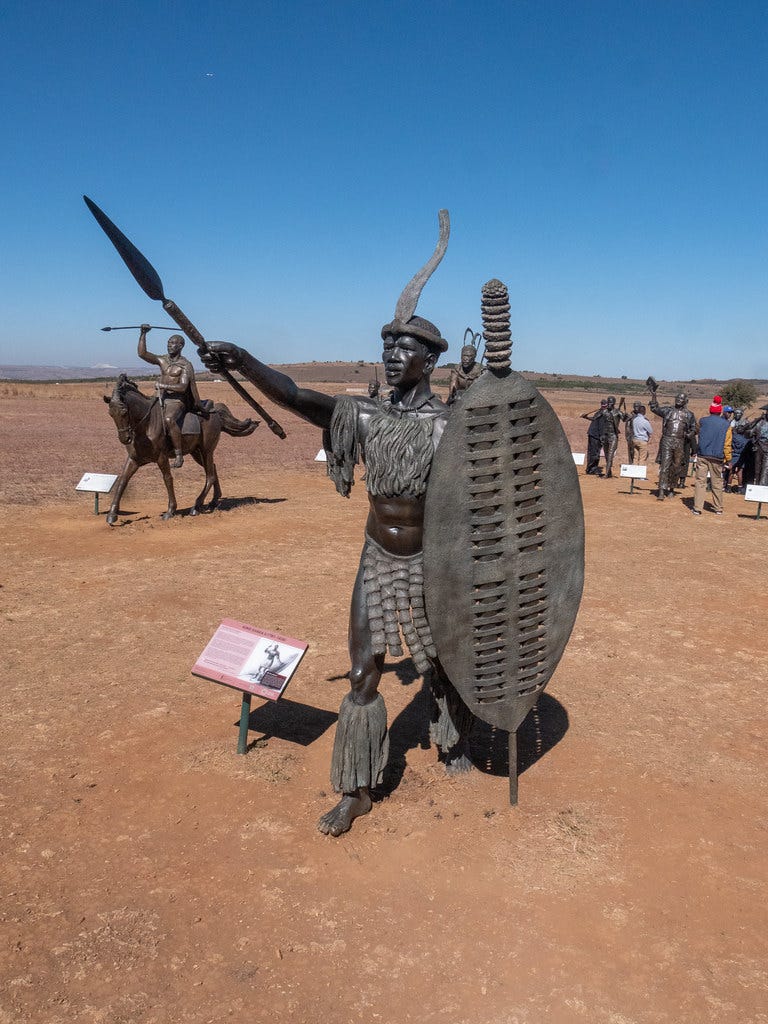The Enduring Legacy of Shaka Zulu
His Military Mastery, Cultural Footprint, and Modern Significance
When we talk about African history, there are many stories that have been hidden from the world or even lost in time. However, there are some stories that endured. Stories that have survived in spite of the trials and tribulations of a continent still unable to control its own narrative. One such story is that of Shaka Zulu. The question is, how much do you really know about King Shaka?
History Reclaimed
As the formidable leader of the Zulu Kingdom during the early 19th century, Shaka's influence extended far beyond the battlefield. He was a visionary who reshaped the cultural, political, and military landscape of Southern Africa.
While his legacy is deeply etched in the African narrative, it has often been relegated to the sidelines in the broader spectrum of world history. So in this article I will delve into the multifaceted legacy of Shaka Zulu, exploring his military innovations, cultural contributions, and the ripple effects of his leadership in contemporary South Africa.
A common theme in the work I’ve been doing, many of the great figures in African history were either forgotten or misrepresented by Eurocentric historians.
Despite Shaka's transformative impact on Southern Africa, his legacy often finds itself overshadowed in global historical narratives. European colonial records, influenced by their biases, frequently painted Shaka as a "savage" despot, obscuring his administrative and military brilliance.
The primarily oral nature of the Zulu tradition meant that much of Shaka's history relied on later accounts, which could be biased. Moreover, a Eurocentric focus in world history narratives has often marginalized significant non-European figures like Shaka.
Every reference to him I have ever heard in the mainstream wasn’t particularly flattering and most definitely didn’t cover the things I’m about to tell you.
So who was he?
Origin Of A Warrior King
Shaka was born around 1787 in the region of present-day KwaZulu-Natal, South Africa. His early life was marked by adversity and rejection. He was the illegitimate son of Senzangakhona, a Zulu chief, and Nandi, an orphaned daughter of a neighbouring clan's chief.
Due to his illegitimate status, young Shaka faced ridicule and was ostracized by the Zulu community. Along with his mother, he was expelled from the Zulu clan and took refuge with the Mthethwa people. It was during these formative years with the Mthethwa that Shaka honed his military skills under the tutelage of Chief Dingiswayo.
Displaying exceptional leadership and combat abilities, he quickly rose through the ranks. When Dingiswayo was killed, Shaka, with his newfound military prowess, sought to reclaim his rightful place in the Zulu clan. He returned to the Zulus, overthrew the reigning chief, and assumed the throne. As king, he embarked on a series of reforms and conquests that would lay the foundation for the Zulu Empire, forever changing the trajectory of Southern African history.
Military Mastery
An aspect of his history I wasn’t aware of was the number of military innovations he was responsible for. Shaka’s introduction of the "iklwa," a short, sharp-edged spear, marked a significant departure from traditional long throwing spears.
Paired with a robust, larger shield, this combination transformed close combat dynamics, giving Zulu warriors a distinct advantage in battle.
The "buffalo horns" formation, a brainchild of Shaka, was a tactical masterstroke. It allowed the Zulu army to surround, isolate, and decimate enemy forces, highlighting Shaka's unparalleled strategic acumen.
Under Shaka's leadership, the Zulu army underwent rigorous training regimes. These programs, which prioritized speed, endurance, and unwavering discipline, molded the Zulu warriors into an unstoppable force.
Rather than annihilating defeated tribes, Shaka assimilated them into his kingdom. This not only ensured a consistent stream of new warriors but also neutralized potential adversaries.
Cultural Footprint
Through his military conquests, Shaka brought disparate tribes under the singular Zulu identity. This unification engendered a collective sense of purpose and belonging. Shaka's "Amabutho" system, which grouped males by age, fostered camaraderie and loyalty, ensuring a continuous supply of warriors. He also emphasized the importance of mourning and respect for the departed, particularly evident after the death of his mother, Nandi. Furthermore, the Zulu language, enriched by Shaka's influence, incorporated elements from other tribes, making it more inclusive and diverse.
A Symbol Of South Africa
Long after his demise, Shaka's influence resonated, especially during South Africa's struggle against apartheid. He became a symbol of resistance, inspiring anti-apartheid activists, including iconic leaders like Nelson Mandela.
In the post-apartheid era, there was a renewed interest in Zulu traditions, with Shaka's legacy being celebrated as a testament to the rich heritage of the Zulu people. His ideals of unity and strength found echoes in the policies of post-apartheid leaders, emphasizing national unity. Furthermore, Shaka's enduring legacy continues to boost tourism, with places like Shakaland offering insights into Zulu traditions and significantly contributing to local economies.
His visionary leadership, military prowess, and cultural influence form a powerful legacy for a warrior king. While he may not feature prominently in global history textbooks, his profound impact on South Africa and the broader African continent remains undeniable and his contributions to the story of Africa should be recognised by the people of Africa.
PAY ATTENTION






Fascinating article, thank you! On the subject of language, I am reminded of the Jet Li film "Hero" which tells the story of the Emperor Qin Shihuang of China uniting the tribes under a common language. My question is, which language would be chosen for Alkebulan?